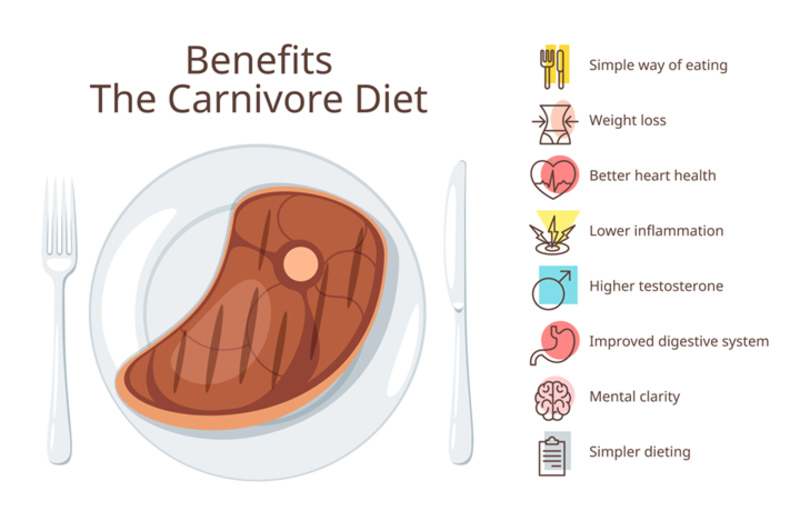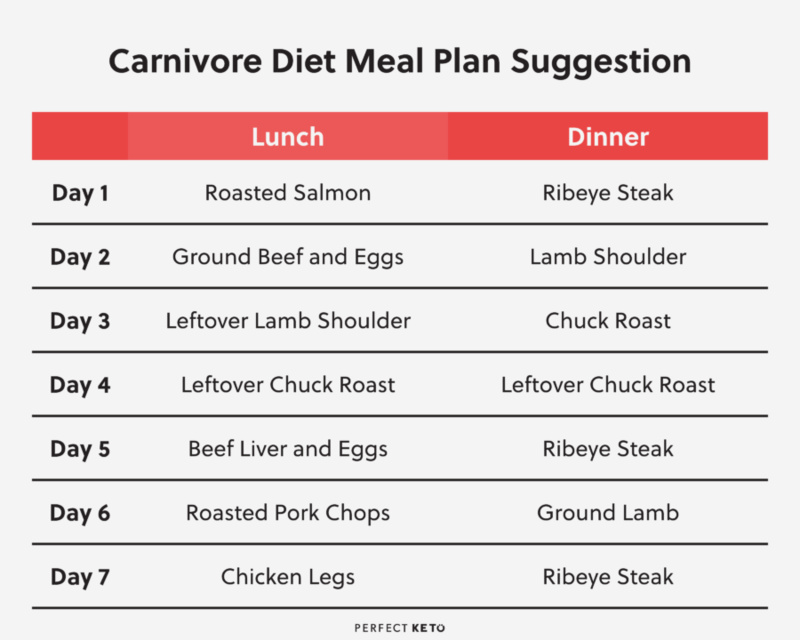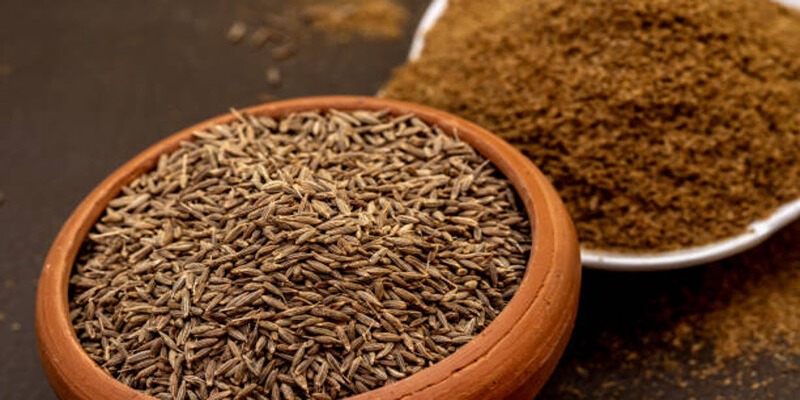Gaining popularity in health and wellness circles, the Carnivore Diet presents a unique approach to nutrition. It revolves exclusively around animal product consumption. This article plunges into its intricacies, examining benefits, probing potential risks, and providing a detailed food list to augment your understanding of this dietary regimen.
Benefits of the Carnivore Diet
Enhanced Nutrient Absorption
The core of the Carnivore Diet's touted benefits is its emphasis on nutrient-dense animal products. Unlike many conventional diets, which incorporate a variety of food groups, this diet believes in enhancing nutrient absorption through an exclusive focus on animal products. Proponents argue that by consuming select meats, fish, and eggs, you can effectively absorb essential vitamins and minerals into your body.
- Focus on Nutrient-Dense Animal Products
Organ meats, lean cuts of meat, and fatty fish are rich in essential nutrients such as iron, zinc, vitamin B12, and omega-3 fatty acids. Thus, they encourage individuals to opt for these nutrient-dense animal products. By doing so, the body receives a concentrated form of bioavailable essential nutrients.
- Improved Absorption of Essential Vitamins and Minerals
Proponents of the Carnivore Diet argue that its distinctive feature eliminating plant-based foods potentially containing anti-nutrients or compounds impeding nutrient absorption. This enhances overall health and well-being by promoting superior absorption of crucial vitamins and minerals.
Potential Weight Loss
The Carnivore Diet's potential for weight loss frequently fuels discussions due to one key aspect; the combination of factors that includes primarily reduced carbohydrate and processed food intake. This leads to increased fat metabolism to subsequent weight loss.
- Reduction in Carbohydrates and Processed Foods
The Carnivore Diet actively excludes carbohydrates and processed foods, fostering an environment that regulates insulin levels and instigates a state of ketosis. This metabolic condition promotes the body's use of stored fat for energy, which could result in weight loss.
Furthermore, eliminating refined sugars and grains from the equation is believed to contribute towards stabilizing blood sugar levels, thus diminishing cravings while fostering sustained feelings of fullness.
- Increased Fat Metabolism and Weight Loss
Proponents argue: that the high-fat content in animal products, which characterizes the Carnivore Diet, actually stimulates the body's fat metabolism. They assert that an augmented consumption of healthy fats enhances efficiency when utilizing stored fat for energy. This not only promotes weight loss but also preserves muscle mass.

Improved Mental Clarity
Proponents of the Carnivore Diet assert not only physical health benefits but also enhancements in mental clarity. They argue these are a result of reduced inflammation and improved brain function, beyond just bodily improvements.
- Reduction in Inflammation
Various chronic conditions, including cognitive decline, have a link to inflammation. Advocates of the Carnivore Diet posit that eliminating potential inflammatory triggers found in certain plant-based foods could reduce overall inflammation for individuals. They believe this reduction subsequently enhances cognitive function and contributes to mental clarity.
- Testimonials and Anecdotal Evidence Supporting Mental Clarity
Limited scientific studies exist on the impact of the Carnivore Diet on mental clarity. However, anecdotal evidence and testimonials are plentiful. Individuals frequently testify to a surge in focus, an increase in alertness, as well as enhanced cognitive performance upon adopting this specific diet.
These personal accounts, though compelling, require rigorous scrutiny. We must approach them with caution and acknowledge our pressing need for further scientific investigation in this area.
In the community, we extensively discuss these aspects, yet approaching the diet with individual health considerations and seeking professional guidance when necessary remains crucial.
Risks Associated with the Carnivore Diet
Nutrient Deficiency Risks
The Carnivore Diet emphasizes consuming nutrient-dense animal products. However, this may pose a potential risk of deficiency in certain essential vitamins and minerals commonly present in plant-based foods.
Nutrients such as fiber, and vitamin C along with an array of diverse phytonutrients could become limited on an all-meat diet. This raises significant concerns about its long-term impact on overall health.
Gastrointestinal Concerns
The Carnivore Diet notably raises concerns about potential gastrointestinal issues such as constipation and other digestive discomfort. A healthy digestive system, crucially dependent on the presence of fiber from plant sources for regular bowel movements, can face challenges due to its absence.
Long-Term Health Implications
The growing popularity of the Carnivore Diet notwithstanding, long-term studies examining its effects on health remain scarce. This limited research presents a challenge in comprehensively assessing the diet's impact on various aspects of long-term well-being.
Those who adhere to the Carnivore Diet should regularly undergo health check-ups and consult healthcare professionals. This strategy, by monitoring key health indicators over time, facilitates the early identification of emerging health concerns. It also permits adjustments in the dietary plan for a balanced and sustainable nutrition approach.
Carnivore Diet Food List
- Meat
The Carnivore Diet, centered around meat consumption, provides a broad range of choices. This ensures nutritional variety.
Varieties of Meat Suitable for the Carnivore Diet:
Consider embracing the Carnivore Diet with a diverse inclusion of red meats, beef, and lamb in particular. They are abundant in essential nutrients such as iron and B vitamins. Poultry options such as chicken and turkey provide lean protein and are also worth your consideration.
Integrate organ meats for an additional boost of vitamins and minerals. These are often regarded as nutrient powerhouses.
- Fish
The incorporation of fish into the Carnivore Diet. This introduces valuable omega-3 fatty acids and a plethora of additional nutrients.
Selection of Fish for Optimal Nutrition:
Salmon, mackerel, and sardines, fatty fish with high omega-3 content are excellent choices. Their fats not only contribute to heart health but also promote overall well-being. Lean protein is supplied by white fish such as cod and haddock without compromising the principles of the Carnivore Diet.
- Eggs
Adding eggs to the Carnivore Diet introduces a versatile, nutrient-dense element. They offer an array of essential vitamins and minerals, a gradation that enhances its nutritional value.
Nutritional Benefits of Eggs:
A nutrition powerhouse, eggs supply high-quality protein and essential amino acids. They also offer an array of vitamins such as B12 and D. These elements enhance your diet by bolstering muscle health and boosting immune function, thus promoting overall vitality.
- Dairy
The Carnivore Diet, by default, omits plant-based dairy alternatives. However, it permits the inclusion of specific animal-based dairy products depending on an individual's tolerance.
Types of Dairy Allowed on the Carnivore Diet:
Those who tolerate them well may include full-fat dairy products such as butter, heavy cream, and specific cheeses in the Carnivore Diet. Incorporating these dairy options not only offers supplementary sources of healthy fats but also elevates the flavor and texture of Carnivore meals.
Select and prepare a diverse range of meats, fish, eggs, and potentially dairy-inclusive. Through this diligent process, you can craft an indulging yet balanced Carnivore Diet. This dietary approach not only satisfies your nutritional needs but also remains steadfast to its unique principles.

Getting Started with the Carnivore Diet
For optimal success, one must embark on the Carnivore Diet with thoughtful planning and a gradual transition.
- Consultation with a Healthcare Professional:
Engage a healthcare professional in a discussion about your health history and goals before delving into the Carnivore Diet. This step guarantees a personalized approach, one that effectively addresses potential concerns or risks linked to this dietary shift.
- Transitioning Gradually:
Gradually eliminate non-meat foods to ease into the Carnivore Diet. This method enables your body to adapt, minimizes potential discomfort, and ensures a smoother adjustment towards this unique nutritional approach.
- Monitoring Health and Well-Being:
During the initial phases, it is crucial to conduct regular check-ups and monitor key health indicators. This ensures that adjustments based on individual responses align the Carnivore Diet with your overall health and well-being.
Bottomline
Concluding, the Carnivore Diet presents a distinctive dietary strategy that harbors potential advantages and hazards. To traverse this nutritional regimen effectively, understanding its principles, incorporating an array of animal products, and being cognizant of individual health factors are pivotal.
Before implementing any substantial alterations to your diet, it is imperative to consult with a healthcare professional consistently.




